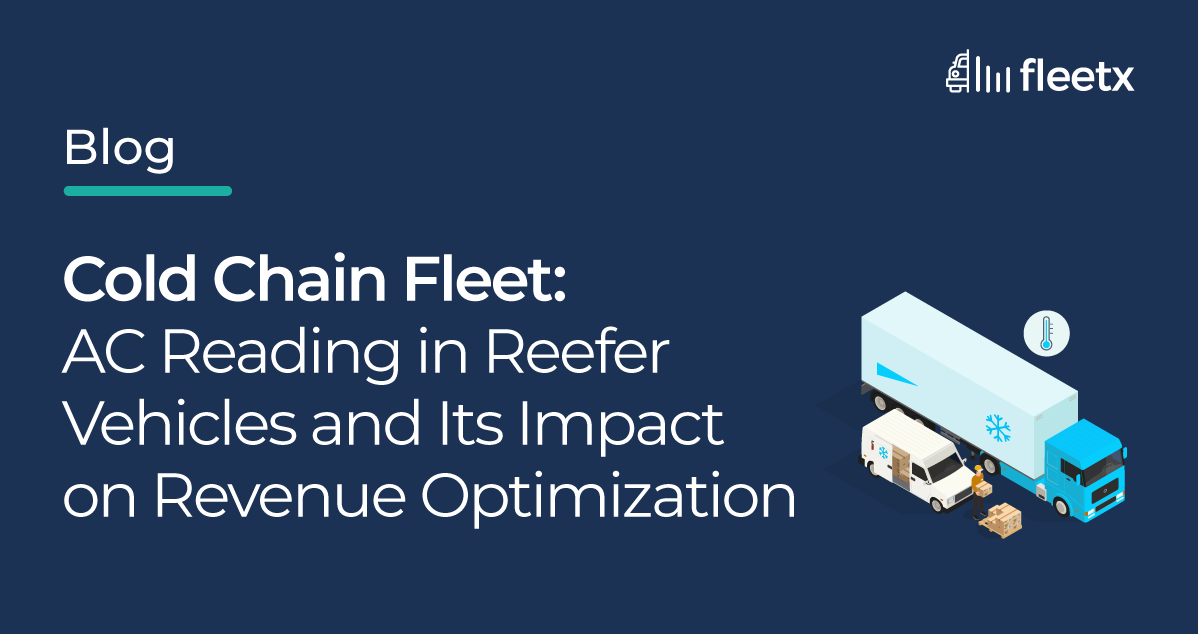
Reefer vehicles are essential for the transportation of perishable goods, such as food and pharmaceuticals. These vehicles use air conditioning to maintain a constant temperature inside the cargo space, which is critical to prevent spoilage/damage and the resulting loss in revenue for the business.
Therefore, the AC reading in reefer vehicles is a key metric for fleet managers to monitor. This reading indicates the current temperature inside the cargo space, and it can be used to identify potential problems with the AC unit. If the AC reading is too high or too low, it could indicate that the unit is not working properly. A study by the Indian Institute of Technology, Bombay found that the average cost of spoilage in the country’s cold chain industry is $200 million per year. This cost is largely due to inaccurate AC readings in reefer trucks.
There are a number of factors that can affect the AC reading in reefer vehicles. These factors include the ambient temperature, the type of goods being transported, and the length of the journey. In this article, we will explore how AC readings promote revenue optimization in the cold chain fleet industry.
Why AC Readings Matter
Identify and Optimise Fuel Consumption: It is important to distinguish between fuel consumed by the vehicle's travel and the fuel utilized by the cold storage system. By monitoring AC readings, fleet operators can analyze the power consumption patterns of the refrigeration unit separately from the overall fuel consumption of the truck's engine. This differentiation allows for a more accurate assessment of the fuel consumption associated with maintaining the required temperature in the cold storage compartment. With this insight, fleet managers can identify potential inefficiencies, optimize temperature control settings, and implement energy-saving measures without compromising product integrity.
Ensure Temperature Compliance: Temperature control is paramount for preserving the quality and safety of perishable goods. AC readings in reefer vehicles provide real-time insights into the temperature conditions within the cargo area. By closely monitoring and maintaining optimal temperature ranges, fleet managers can ensure that the goods are transported in compliance with the specific temperature requirements. This prevents spoilage, minimizes product loss, and enhances customer satisfaction, ultimately contributing to revenue optimization.
Reduce Risk of Product Loss: A slight deviation from the desired temperature range during transportation can have bad effects on perishable goods, even during a short span of time. High temperatures can accelerate spoilage, while low temperatures can cause freezing and damage the quality of sensitive products. AC readings act as a proactive measure to identify any temperature fluctuations or abnormalities in real-time.
With such insights, fleet managers can promptly address any issues, rectify temperature deviations, prevent potential product loss and ensure accountability. By reducing the risk of repeated spoilage, rejections, and customer complaints, fleet operators can maximize profits.
Performance Monitoring and Alert Systems: By collecting and analyzing AC reading data from reefer vehicles, fleet operators can establish performance benchmarks and set alert thresholds for temperature variations. Data analytics can help identify patterns and deviations from optimal temperature ranges, triggering alerts and notifications when readings go beyond acceptable limits. This proactive approach allows fleet managers to take immediate action, rectify temperature issues, and prevent potential product loss.
Furthermore, by incorporating predictive maintenance algorithms, fleet operators can schedule maintenance and repairs based on data-driven insights. This reduces the risk of unexpected breakdowns during transportation, which can result in delays, compromised temperature control, and revenue loss. By ensuring consistent temperature control, revenue loss due to spoilage and rejected deliveries can be minimized.
Maintain Regulatory Compliance: The cold chain industry is subject to strict regulations and guidelines to ensure the safety and quality of transported goods, as they can have adverse health effects. AC readings in reefer vehicles serve as critical data points to demonstrate compliance with these regulations. By consistently maintaining and recording the appropriate temperature levels throughout the transportation process, fleet managers can demonstrate due diligence and adherence to industry standards. This not only helps avoid penalties and legal complications but also enhances the reputation of the fleet, attracting more customers and driving revenue growth.
Data-Driven Decision Making: By analyzing AC reading data, fleet operators can gain valuable insights into the performance and efficiency of reefer units. This information can inform decision-making processes related to fleet optimization, including equipment upgrades, replacement strategies, or adjustments to temperature control protocols. Data-driven decision making ensures that resources are allocated efficiently, reducing operational costs, minimizing revenue loss due to spoilage, and maximizing overall revenue.
Build Customer Trust and Loyalty: In the cold chain industry, trust and reliability are paramount. AC readings offer concrete data to demonstrate the commitment of the fleet business towards maintaining the quality of transported goods. By consistently delivering products within the desired temperature ranges and providing accurate records of AC readings, fleet operators can build trust with their customers. Satisfied customers are more likely to remain loyal, provide repeat business, and even recommend the service to others. Ultimately, this customer loyalty translates into increased revenue and business growth.
The Bottom Line
Adopting AC readings in cold chain fleets is a game-changer for revenue optimization and overall business growth. The ability to monitor and analyze AC readings in reefer vehicles empowers fleet operators with actionable insights, leading to enhanced temperature control, reduced spoilage, and increased profitability.
By optimizing temperature control through AC reading analysis, fleets can reduce fuel consumption by up to 15%, minimize maintenance costs, and maximize vehicle utilization. These cost-saving measures directly contribute to revenue optimization, allowing fleet operators to allocate resources more efficiently and invest in future growth initiatives.






